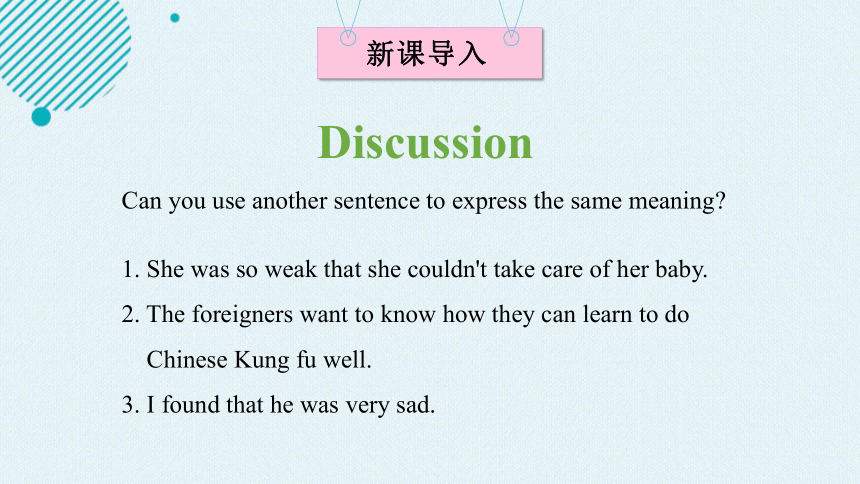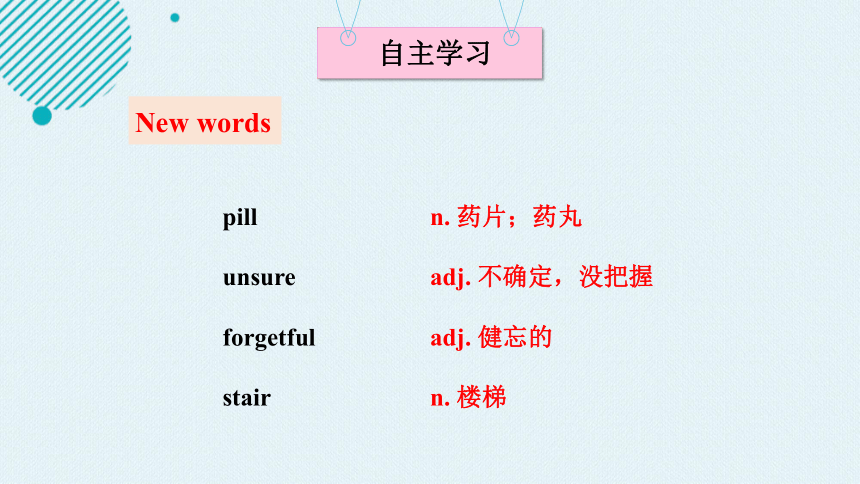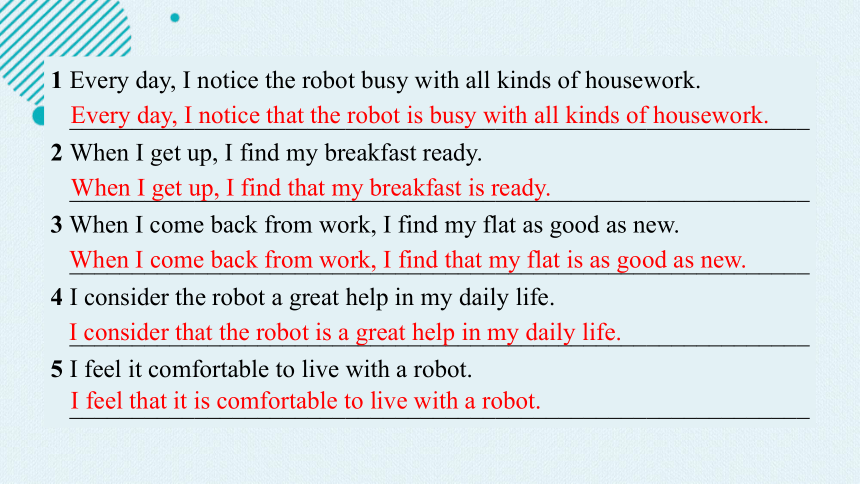Unit 3 Robots Period 3 Grammar课件 (共22张PPT) 牛津译林版九年级下册
文档属性
| 名称 | Unit 3 Robots Period 3 Grammar课件 (共22张PPT) 牛津译林版九年级下册 |  | |
| 格式 | pptx | ||
| 文件大小 | 1.3MB | ||
| 资源类型 | 教案 | ||
| 版本资源 | 牛津译林版 | ||
| 科目 | 英语 | ||
| 更新时间 | 2024-11-03 12:48:34 | ||
图片预览









文档简介
(共22张PPT)
Unit 3
Robots
Period 3
Grammar
1.学习目标
3.重点探究
2.自主学习
学习导航
5.当堂检测
6.课堂总结
4.拓展提升
新课导入
Discussion
Can you use another sentence to express the same meaning
1. She was so weak that she couldn't take care of her baby.
2. The foreigners want to know how they can learn to do
Chinese Kung fu well.
3. I found that he was very sad.
1.能熟悉并正确运用本课时的重点单词和短语。
2.能掌握用“宾语+宾语补足语”将宾语从句转换成简单句。
3.能掌握用“疑问词+动词不定式”将宾语从句转换成简单句。
4.能掌握用“动词不定式”将结果状语从句和目的状语从句转
换成简单句。
学习目标
New words
自主学习
pill
unsure
forgetful
stair
n. 药片;药丸
adj. 不确定,没把握
adj. 健忘的
n. 楼梯
重点探究
Look at the sentences and try to work out the rule.
Sometimes we use objects + object complements to replace object clauses. (有时我们用“宾语+宾语补足语”来代替宾语从句。)
He saw that the robot was making breakfast.
He saw the robot making breakfast.
He found that his flat was in a complete mess.
He found his flat in a complete mess.
He thinks that it is too much trouble to own a robot.
He thinks it too much trouble to own a robot.
Before the robot went wrong, Mr Jiang was talking on the phone with his mother about it. Use an object clause to rewrite each of his sentences.
1 Every day, I notice the robot busy with all kinds of housework.
___________________________________________________________
2 When I get up, I find my breakfast ready.
___________________________________________________________
3 When I come back from work, I find my flat as good as new.
___________________________________________________________
4 I consider the robot a great help in my daily life.
___________________________________________________________
5 I feel it comfortable to live with a robot.
___________________________________________________________
When I get up, I find that my breakfast is ready.
Every day, I notice that the robot is busy with all kinds of housework.
I consider that the robot is a great help in my daily life.
When I come back from work, I find that my flat is as good as new.
I feel that it is comfortable to live with a robot.
Look at the sentences and try to work out the rule.
Sometimes we use question words + to-infinitives to replace object clauses. (有时我们用疑问词+不定式来代替宾语从句。)
The robot no longer knew when it should cook breakfast.
The robot no longer knew when to cook breakfast.
Mr Jiang did not know what he should do with the robot.
Mr Jiang did not know what to do with the robot.
Mr Jiang wrote a letter to his mother before going on a business trip. Use a question word + to-infinitive to replace each object clause. Write them above the clauses.
Dear Mum,
I am going on a business trip to Shenzhen tomorrow. I have asked my robot to look after you while I am away.
You have a serious heart problem and have to take medicine every day. However, you have a poor memory and often forget when you should take your pills. My robot will remind you to take them at the right time.
when to
take your pills
If you want to go out, my robot will help you find your coat—you are always unsure where you could find your clothes. My robot will go to the supermarket to buy some fruit and vegetables for you, as you often cannot decide which you should choose at the supermarket. You often feel lonely because you do not know who you can talk to, and my robot will try to do something to make you happy.
Take care and I will see you soon!
Yours,
Jiang Shan
where to find your clothes
which to choose at the supermarket
who to talk to
Look at the sentences and try to work out the rule.
We can also use to-infinitives to replace some adverbial clauses expressing results or purposes. (我们也可以用“动词不定式”来代替一些表达结果或目的的状语从句。)
Mr Jiang is always so busy that he does not have any time for hobbies.
Mr Jiang is always too busy to have any time for hobbies.
The robot is so smart that it can do a lot of things for Mr Jiang.
The robot is smart enough to do a lot of things for Mr Jiang.
Mr Jiang plans to buy a robot so that he can have more free time.
Mr Jiang plans to buy a robot in order to have more free time.
Mr Jiang's mother was very pleased with the robot. She is telling Mr Jiang on the phone about her life with the robot. Rewrite her sentences with to-infinitives.
1 I was so forgetful that I didn't lock the door last night.
I was too forgetful _____________________________________.
2 The robot was so careful that it reminded me of this.
The robot was careful enough ____________________________.
3 I was so weak that I couldn't go up and down the stairs often.
I was too weak ________________________________________.
4 The robot was so kind that it bought me everything I needed.
The robot was kind enough ______________________________.
5 Sometimes I took a walk with it so that I could have a better sleep.
Sometimes I took a walk with it in order ____________________.
to lock the door last night
to remind me of this
to go up and down the stairs often
to buy me everything I needed
to have a better sleep
拓展提升
Language Points
1. My robot will remind you to take them at the right time.
我的机器人会提醒你在正确的时间服用它们。
remind sb. to do sth. 提醒某人做某事
e.g. Please remind me to attend the meeting.
请提醒我参加会议。
remind sb. of sth. 使某人想起某事;提醒某人某事
e.g. The old picture reminds me of one of my friends.
这张老照片使我想起来我的一位朋友。
简单句和复合句之间的转换(一)
我们可以用“宾语+宾语补足语”、“疑问词+动词不定式”将宾语从句转换成简单句;我们可以用动词不定式将结果状语从句或目的状语从句转换成简单句。如:
I saw that he was reading the book carefully. 我看到他在仔细读书。
I saw him reading the book carefully.
I know how I should drive a car. 我知道如何开车。
I know how to drive a car.
He got up early so that he would not miss the train.
为了不错过这班火车,他很早就起床了。
He got up early in order not to miss the train.
我们可以用“宾语+宾语补足语”将宾语从句转换成简单句。如:
I found that he was very happy. 我发现他很快乐。
I found him very happy.
I noticed that he was entering the room. 我注意到他进入这个房问。
I noticed him entering the room.
注意:和find、notice有相同用法的动词有hear、see、think、watch等。
我们可以用“疑问词+动词不定式”将宾语从句转换成简单句。如:
I do not know what I will do tomorrow. 我不知道我明天要做什么。
I do not know what to do tomorrow.
I wonder how I should go to the airport. 我想知道我该如何去机场。
I wonder how to go to the airport.
注意:1 疑问词why不能和动词不定式连用。
2 用“疑问词+动词不定式”将宾语从句转换成简单句的前提是宾语从句的主语和主句的主语一致,且主语的谓语动词通常是know、remember、forget、learn等。
我们可以用“动词不定式”将结果状语从句或目的状语从句转换成简单句。如:
He is so young that he cannot go to school. 他年纪太小,还不能上学。
He is too young to go to school.
She is so clever that she can work out this difficult maths question.
她很聪明,能够解答这道数学难题。
She is clever enough to work out this difficult maths question.
He exercises every day so that he can keep fit.
为了保持健康,他每天锻炼身体。
He exercises every day in order to keep fit.
注意:
1 用“动词不定式”将结果状语从句或目的状语从句转换成简单句的前提是从句的主语和主句的主语一致。
2 结果状语从句so ... that ... 的结构可以用too ... to ... 或(not) ... enough to ... 来转换;目的状语从句可以用 in order to来转换。
1. He noticed that a robot shop was open at the shopping mall.
He noticed a robot shop _____________________________. 2. I have no idea of what I should do next.
I have no idea of ___________________________________.3. I don't know how I can get to the hospital.
I don't know ______________________________________.
4. They are so happy that they forget the time.
They are too happy _________________________________. 5. I drink milk every day so that I can grow taller.
I drink milk every day _______________________________.
当堂检测
将下列句子改写简单句。
open at the shopping mall
what to do next
how to get to the hospital
to remember the time
in order to grow taller
课堂总结
重点单词和和短语:
pill, unsure, forgetful, stair, remind sb. to do sth., remind sb. of. sth.
简单句和复合句之间的转换(一):
我们可以用“_________________”将宾语从句转换成简单句;
我们可以用“_________________”将宾语从句转换成简单句;
我们可以用“_________________”将结果状语从句和目的状语从句转换成简单句。
Unit 3
Period 3
宾语+宾语补足语
疑问词+动词不定式
动词不定式
Unit 3
Robots
Period 3
Grammar
1.学习目标
3.重点探究
2.自主学习
学习导航
5.当堂检测
6.课堂总结
4.拓展提升
新课导入
Discussion
Can you use another sentence to express the same meaning
1. She was so weak that she couldn't take care of her baby.
2. The foreigners want to know how they can learn to do
Chinese Kung fu well.
3. I found that he was very sad.
1.能熟悉并正确运用本课时的重点单词和短语。
2.能掌握用“宾语+宾语补足语”将宾语从句转换成简单句。
3.能掌握用“疑问词+动词不定式”将宾语从句转换成简单句。
4.能掌握用“动词不定式”将结果状语从句和目的状语从句转
换成简单句。
学习目标
New words
自主学习
pill
unsure
forgetful
stair
n. 药片;药丸
adj. 不确定,没把握
adj. 健忘的
n. 楼梯
重点探究
Look at the sentences and try to work out the rule.
Sometimes we use objects + object complements to replace object clauses. (有时我们用“宾语+宾语补足语”来代替宾语从句。)
He saw that the robot was making breakfast.
He saw the robot making breakfast.
He found that his flat was in a complete mess.
He found his flat in a complete mess.
He thinks that it is too much trouble to own a robot.
He thinks it too much trouble to own a robot.
Before the robot went wrong, Mr Jiang was talking on the phone with his mother about it. Use an object clause to rewrite each of his sentences.
1 Every day, I notice the robot busy with all kinds of housework.
___________________________________________________________
2 When I get up, I find my breakfast ready.
___________________________________________________________
3 When I come back from work, I find my flat as good as new.
___________________________________________________________
4 I consider the robot a great help in my daily life.
___________________________________________________________
5 I feel it comfortable to live with a robot.
___________________________________________________________
When I get up, I find that my breakfast is ready.
Every day, I notice that the robot is busy with all kinds of housework.
I consider that the robot is a great help in my daily life.
When I come back from work, I find that my flat is as good as new.
I feel that it is comfortable to live with a robot.
Look at the sentences and try to work out the rule.
Sometimes we use question words + to-infinitives to replace object clauses. (有时我们用疑问词+不定式来代替宾语从句。)
The robot no longer knew when it should cook breakfast.
The robot no longer knew when to cook breakfast.
Mr Jiang did not know what he should do with the robot.
Mr Jiang did not know what to do with the robot.
Mr Jiang wrote a letter to his mother before going on a business trip. Use a question word + to-infinitive to replace each object clause. Write them above the clauses.
Dear Mum,
I am going on a business trip to Shenzhen tomorrow. I have asked my robot to look after you while I am away.
You have a serious heart problem and have to take medicine every day. However, you have a poor memory and often forget when you should take your pills. My robot will remind you to take them at the right time.
when to
take your pills
If you want to go out, my robot will help you find your coat—you are always unsure where you could find your clothes. My robot will go to the supermarket to buy some fruit and vegetables for you, as you often cannot decide which you should choose at the supermarket. You often feel lonely because you do not know who you can talk to, and my robot will try to do something to make you happy.
Take care and I will see you soon!
Yours,
Jiang Shan
where to find your clothes
which to choose at the supermarket
who to talk to
Look at the sentences and try to work out the rule.
We can also use to-infinitives to replace some adverbial clauses expressing results or purposes. (我们也可以用“动词不定式”来代替一些表达结果或目的的状语从句。)
Mr Jiang is always so busy that he does not have any time for hobbies.
Mr Jiang is always too busy to have any time for hobbies.
The robot is so smart that it can do a lot of things for Mr Jiang.
The robot is smart enough to do a lot of things for Mr Jiang.
Mr Jiang plans to buy a robot so that he can have more free time.
Mr Jiang plans to buy a robot in order to have more free time.
Mr Jiang's mother was very pleased with the robot. She is telling Mr Jiang on the phone about her life with the robot. Rewrite her sentences with to-infinitives.
1 I was so forgetful that I didn't lock the door last night.
I was too forgetful _____________________________________.
2 The robot was so careful that it reminded me of this.
The robot was careful enough ____________________________.
3 I was so weak that I couldn't go up and down the stairs often.
I was too weak ________________________________________.
4 The robot was so kind that it bought me everything I needed.
The robot was kind enough ______________________________.
5 Sometimes I took a walk with it so that I could have a better sleep.
Sometimes I took a walk with it in order ____________________.
to lock the door last night
to remind me of this
to go up and down the stairs often
to buy me everything I needed
to have a better sleep
拓展提升
Language Points
1. My robot will remind you to take them at the right time.
我的机器人会提醒你在正确的时间服用它们。
remind sb. to do sth. 提醒某人做某事
e.g. Please remind me to attend the meeting.
请提醒我参加会议。
remind sb. of sth. 使某人想起某事;提醒某人某事
e.g. The old picture reminds me of one of my friends.
这张老照片使我想起来我的一位朋友。
简单句和复合句之间的转换(一)
我们可以用“宾语+宾语补足语”、“疑问词+动词不定式”将宾语从句转换成简单句;我们可以用动词不定式将结果状语从句或目的状语从句转换成简单句。如:
I saw that he was reading the book carefully. 我看到他在仔细读书。
I saw him reading the book carefully.
I know how I should drive a car. 我知道如何开车。
I know how to drive a car.
He got up early so that he would not miss the train.
为了不错过这班火车,他很早就起床了。
He got up early in order not to miss the train.
我们可以用“宾语+宾语补足语”将宾语从句转换成简单句。如:
I found that he was very happy. 我发现他很快乐。
I found him very happy.
I noticed that he was entering the room. 我注意到他进入这个房问。
I noticed him entering the room.
注意:和find、notice有相同用法的动词有hear、see、think、watch等。
我们可以用“疑问词+动词不定式”将宾语从句转换成简单句。如:
I do not know what I will do tomorrow. 我不知道我明天要做什么。
I do not know what to do tomorrow.
I wonder how I should go to the airport. 我想知道我该如何去机场。
I wonder how to go to the airport.
注意:1 疑问词why不能和动词不定式连用。
2 用“疑问词+动词不定式”将宾语从句转换成简单句的前提是宾语从句的主语和主句的主语一致,且主语的谓语动词通常是know、remember、forget、learn等。
我们可以用“动词不定式”将结果状语从句或目的状语从句转换成简单句。如:
He is so young that he cannot go to school. 他年纪太小,还不能上学。
He is too young to go to school.
She is so clever that she can work out this difficult maths question.
她很聪明,能够解答这道数学难题。
She is clever enough to work out this difficult maths question.
He exercises every day so that he can keep fit.
为了保持健康,他每天锻炼身体。
He exercises every day in order to keep fit.
注意:
1 用“动词不定式”将结果状语从句或目的状语从句转换成简单句的前提是从句的主语和主句的主语一致。
2 结果状语从句so ... that ... 的结构可以用too ... to ... 或(not) ... enough to ... 来转换;目的状语从句可以用 in order to来转换。
1. He noticed that a robot shop was open at the shopping mall.
He noticed a robot shop _____________________________. 2. I have no idea of what I should do next.
I have no idea of ___________________________________.3. I don't know how I can get to the hospital.
I don't know ______________________________________.
4. They are so happy that they forget the time.
They are too happy _________________________________. 5. I drink milk every day so that I can grow taller.
I drink milk every day _______________________________.
当堂检测
将下列句子改写简单句。
open at the shopping mall
what to do next
how to get to the hospital
to remember the time
in order to grow taller
课堂总结
重点单词和和短语:
pill, unsure, forgetful, stair, remind sb. to do sth., remind sb. of. sth.
简单句和复合句之间的转换(一):
我们可以用“_________________”将宾语从句转换成简单句;
我们可以用“_________________”将宾语从句转换成简单句;
我们可以用“_________________”将结果状语从句和目的状语从句转换成简单句。
Unit 3
Period 3
宾语+宾语补足语
疑问词+动词不定式
动词不定式
